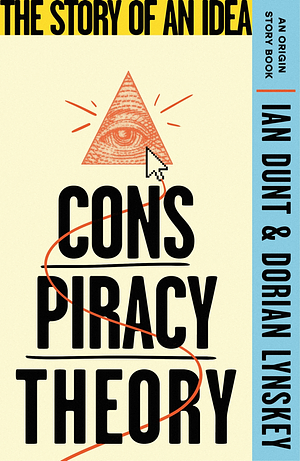
Conspiracy Theory: The Story of an Idea
by Ian Dunt, Dorian Lynskey
Genres: History, Non-fictionPages: 184
Series: Origin Stories #2
Rating:

Synopsis:What makes people believe in conspiracy theories? Why have they taken over our political sphere? And how do we counter them before it’s too late?
The world has always had conspiracy theories. From the Illuminati to the deep state, the JFK assassination to the death of Princess Diana – there have always been those who believe that events are manipulated by shadowy forces with sinister intent. But in recent years, conspiracism has colonised the mainstream. These days, it is a booming industry, a political strategy and a pseudo-religion – and it’s threatening the foundations of liberal democracy.
Where once political battles were fought over ideas and values, it now feels as though we’re arguing over the nature of reality itself. The problem is bigger than lizard people or UFOs: left unchecked, conspiracy theories have the power to warp the fabric of society and justify unspeakable crimes.
In Conspiracy Theory: The Story of an Idea, Ian Dunt and Dorian Lynskey pull back the curtain on conspiracy theories: where they come from, who promotes them, how they work and what they’re doing to us. From biblical myth to online hysteria, this book explains what happens when the human gift for storytelling goes wrong – and how we might restore our common reality.
If you’ve already read about conspiracy theories much before, Ian Dunt and Dorian Lynskey’s Conspiracy Theory doesn’t offer a lot that’s new. They try to tackle the history of conspiracy theories, the psychology of why we believe them, and also what can be done about them, which is a big ask in a small space.
The history manages to be reasonable thorough, or that’s my impression: I only vaguely knew about the original actual Illuminati, and there were aspects of historical USian conspiracy stuff that I didn’t know a lot about. It discusses Kennedy’s assassination, of course, but also more recent stuff like Pizzagate: it’s definitely modern and relevant, though feels slightly weird that it doesn’t address Trump’s new presidency and what that might mean for conspiracy theories (which is not the book’s fault, to be clear — it was released only just after the US election).
In a way, that fact makes the book feel defeated right away once we get onto the stuff about what to do about conspiracy theories, to be honest. How can one focus on deplatforming people who spout conspiracy theories when Trump’s about to be president again? [Not to mention everything that’s happening at the time of this review’s posting — it was originally written in January.] The chapter on defanging conspiracy theories is also quite short, because I think if that was the problem you want to solve… you wouldn’t want to start from here.
Ultimately, it was interesting but didn’t really add much for me. Rob Brotherton’s Suspicious Minds (which the authors reference) is better and more in depth.
Rating: 3/5
